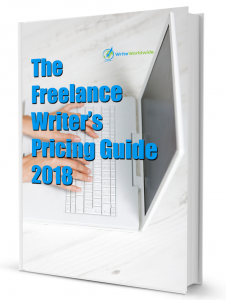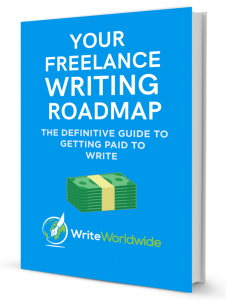Yesterday, Nick shared his story of achieving success without choosing a specific freelance writing niche.
He simply chose a couple of services he could perform well, made a list of companies in a few industries he was comfortable writing about, and got down to work taking action based on the advice in Bamidele’s Earn Your First $1,000 Challenge.
He went on to explain that he wasn’t comfortable choosing a tightly defined niche when he started out. He knows himself better than anybody, and he knew picking just one niche would be a roadblock that could prevent him from taking the action steps needed to start winning freelance writing clients.
Nick’s story proves that you don’t always need to pick a freelance writing niche to succeed. I did choose one, and I’m writing the second part of this post to give you the other side of the story. Here’s how it worked out for me …
Why I Chose a Niche
I started freelance writing around the same time as Nick – the middle of 2016 – and immediately decided to pick an industry niche to focus on. I’d read about freelance writing as a career, and one thing I’d heard again and again was to pick a niche.
Specialist writers usually earn more than generalist writers. That’s just how it is. If you position yourself as a specialist, prospects and clients will perceive your value to be higher. And a higher perceived value means more money.
Position yourself well as a specialist writer and you could earn more than a generalist for the same billable hours. But as with most things in life, it’s not quite that simple …
Is Picking a Freelance Writing Niche Right for You?
If you’re on the fence about being a generalist or a specialist, here are some important points you really should consider:
- You should be confident you’ve picked the right freelance writing niche – If you’re going to pick a niche you need to choose one you’ll enjoy over the long term. You’ll be doing a lot of research and writing around the industry as a whole, so you’ll burn out pretty quick if you don’t find it interesting.
- You should take the time to study your ideal clients and craft your website to speak directly to their needs – You’ve picked a niche you love, now you need to find out about your ideal clients so you can position yourself as an expert to them. This takes time. Read the publications your prospects read, join in with their conversations on LinkedIn, talk to them on the phone, find out everything you can about the challenges they face each day.
- You should be willing to play the long game – Since picking a niche is all about achieving expert status, I don’t think you should pick a niche if you desperately need money coming in right now. Building the level of expertise and trust you’ll need within an industry takes time and dedication at the beginning, but each success builds on the next as you start to build a reputation.
How I Chose My Niche
My niche is the pet industry. It’s a great industry with a wide variety of topics to write about and projects to tackle. I decided on my niche relatively quickly. If you’re committed to being a specialist writer I think you should pick your niche quickly, too.
As Nick discussed yesterday, choosing a niche can be a huge mental block for lots of writers. Don’t overcomplicate things. It’s really pretty simple to choose a niche. Here’s how I chose mine:
- I wrote out a list of all my hobbies and interests
- I wrote out a list of my work (and life) experience
- I made a shortlist of industries that fit with my experience and interests
- I did some research to find out whether the industries on my shortlist were experiencing growth
After going through this simple process, I discovered that the pet industry seemed like a good fit. I’ve kept pets all my life, been involved with animal rescue, and find animals a fascinating topic to write about.
I’m not a veterinarian with 30 years experience, but the point is I don’t need to be. If you’re interested in a niche you’ll enjoy learning more about it. After a while of focusing on a niche, guess what? You’ll be an expert. Simply because you’ve taken the time to learn all you can about it.
I think picking a niche has been a good choice for me. I’m starting to get a steady flow of work at good rates, and each success really does build on the last. I now have a good number of samples I can show to prospects, and they’re all relevant to the industry I’m working in.
Could I have picked up more work and filled my schedule sooner by generalising? Sure. But I’m building my freelance writing career around my day job right now, and I think doing it this way is both sustainable, and a great way to build a foundation of clients that pay well.
Another tactic would be to generalise at first, fill up your schedule with the best paying work you can find, then phase out the lower paying clients so you’re left with those who pay well.
To Niche Or Not To Niche, That Is The Question
So, would I recommend choosing a niche? As I’ve discussed, a lot of that has to do with you and your situation. You are the only person who can figure out what will work best for you.
However you do it though, one thing always remains a constant: Those who take action get results. We’ve talked about it on the blog before, but it’s so important to drive this point home. You WILL see results if you pick a proven course of action, such as Bamidele’s challenge, and work consistently towards your goal of being a successful freelance writer.
Deciding on whether or not to choose a niche isn’t the huge issue many writers think it is. We’ve shown you both sides of the story this week. You can build a freelance writing career as a specialist or a generalist – but only if you have a strong enough desire and the motivation to take consistent action.
So, which side of the fence are you on? Are you a generalist ready to write about all sorts of subjects, or a specialist intent on building your career around expert knowledge and a targeted freelance writing niche? Let us know in the comments!




I am into personal development niche. is it a good niche to start up as a beginner freelancer?
Hi Gideon,
The personal development niche is very saturated and broad. I think if you want to achieve success with it, you really need to niche down even more, perhaps by focusing on mental health or something. I’m also not sure how profitable it as I have limited experience with it.
Best,
I chose the healthcare niche because I have some background and experience in it. I will work hard to stand out. Thanks for the write up.
Hi Ezra,
Thanks for your comment. How’s the writing for the healthcare niche coming along?
Best,